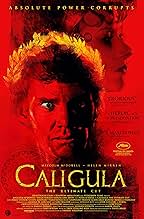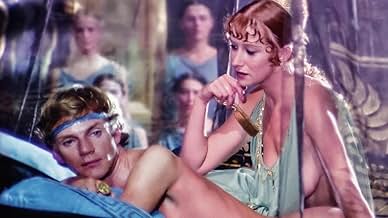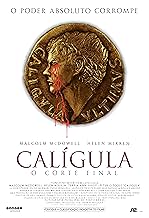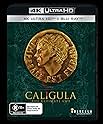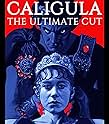ÉVALUATION IMDb
6,3/10
1,7 k
MA NOTE
Ajouter une intrigue dans votre langueFollows Caligula as he kills his devious adoptive grandfather and takes control of the decadent Roman Empire, spiralling into depravity, devastation, and madness.Follows Caligula as he kills his devious adoptive grandfather and takes control of the decadent Roman Empire, spiralling into depravity, devastation, and madness.Follows Caligula as he kills his devious adoptive grandfather and takes control of the decadent Roman Empire, spiralling into depravity, devastation, and madness.
Malcolm McDowell
- Caligula
- (archive footage)
Helen Mirren
- Caesonia
- (archive footage)
Teresa Ann Savoy
- Drusilla
- (archive footage)
Peter O'Toole
- Tiberius
- (archive footage)
John Gielgud
- Nerva
- (archive footage)
Guido Mannari
- Macro
- (archive footage)
Giancarlo Badessi
- Claudius
- (archive footage)
Bruno Brive
- Gemellus
- (archive footage)
Adriana Asti
- Ennia
- (archive footage)
Leopoldo Trieste
- Charicles
- (archive footage)
Paolo Bonacelli
- Chaerea
- (archive footage)
John Steiner
- Longinus
- (archive footage)
Mirella D'Angelo
- Livia
- (archive footage)
Donato Placido
- Proculus
- (archive footage)
Osiride Pevarello
- Giant
- (archive footage)
John Francis Lane
- Major Domo
- (archive footage)
Eduardo Bergara Leumann
- Bergarius
- (archive footage)
Andrew Lord Miller
- Senator Acesius
- (archive footage)
Avis en vedette
Caligula is a film with a storied history. What began as a sprawling historical epic saw much of the film land on the cutting room floor. In its place, a violent and pornographic cash-grab that bore little resemblance to the script by Gore Vidal. Though a box office success, thanks to the controversy surrounding the film, critics derided it, and the cast disowned it. Now, forty-four years later, Caligula: The Ultimate Cut intends to showcase the film's original vision-a riveting and complex historical drama showcasing the intoxicating allure of sexuality and power. The film runs nearly three hours, is entirely fascinating, and delivers a triumphant expose on how 'absolute power corrupts absolutely.' In an era of director's cuts and alternate versions, Caligula is a magnificent restoration with a triumphant zeal.
Full Review: Geek Vibes Nation.
Full Review: Geek Vibes Nation.
Difficult to write too much.
I appreciated the final result of long fight for offer the quasi original film. I liked the new scenes , offering some fresh air to a movie representing, including for bitter critics, a legend or a sort of classic.
My curiosity was about the impressions of viewer discovering only this version. Its virtue- the idea of power without limits and its price becomes more clear , familiar frames are almost in new light but the essence is the same and the pornographic scenes are less significant than you imagine seeing the previews version.
Impressive ? No doubts !
Perfect ? Far to hope to become. Maybe provocative but it is its basic virtue . In short, for many reasons, an absolutely must see.
I appreciated the final result of long fight for offer the quasi original film. I liked the new scenes , offering some fresh air to a movie representing, including for bitter critics, a legend or a sort of classic.
My curiosity was about the impressions of viewer discovering only this version. Its virtue- the idea of power without limits and its price becomes more clear , familiar frames are almost in new light but the essence is the same and the pornographic scenes are less significant than you imagine seeing the previews version.
Impressive ? No doubts !
Perfect ? Far to hope to become. Maybe provocative but it is its basic virtue . In short, for many reasons, an absolutely must see.
This is truly a lost opportunity. After a massive search, a film scholar tracked down all of the original film shot by director Tinto Brass, who is still alive, and he wante4d to work with Brass to finally make a director's cut.
Penthouse, which own the rights, changed management and the new management instead turned the footage over to some people with absolutely no background in film restoration. This new team said they wanted to restore the film to the intentions of Gore Vidal's script. The main problem with that is Tinto Brass was not filming Vidal's script as it was written, as he thought it was terrible. He and actor Malcolm McDowell reworked the script into something more of an art film.
The result of this restoration is that the scenes are finally in the right order but put together with with no sense of style or pacing. Tinto Brass envisioned lots of close up and fast editing, and completed about half of the film this way. Instead we get long takes that emphasize the lavish sets and obscure the action. It looks like a rough cut that is waiting for someone to add closeups and quicken the pace. A few individual scenes work much better in the original due to better editing.
Another drawback is the overly modern score, which doesn't reflect musical trends of the 1970s, when the film was shot.
On the plus side, all of the incongruous hardcore scenes shot by Penthouse chief Bob Guccione are gone. A more coherent performance by Malcolm McDowell can be seen, though at times some of the more manic takes might have worked better to emphasize his deteriorating mental state.
Penthouse, which own the rights, changed management and the new management instead turned the footage over to some people with absolutely no background in film restoration. This new team said they wanted to restore the film to the intentions of Gore Vidal's script. The main problem with that is Tinto Brass was not filming Vidal's script as it was written, as he thought it was terrible. He and actor Malcolm McDowell reworked the script into something more of an art film.
The result of this restoration is that the scenes are finally in the right order but put together with with no sense of style or pacing. Tinto Brass envisioned lots of close up and fast editing, and completed about half of the film this way. Instead we get long takes that emphasize the lavish sets and obscure the action. It looks like a rough cut that is waiting for someone to add closeups and quicken the pace. A few individual scenes work much better in the original due to better editing.
Another drawback is the overly modern score, which doesn't reflect musical trends of the 1970s, when the film was shot.
On the plus side, all of the incongruous hardcore scenes shot by Penthouse chief Bob Guccione are gone. A more coherent performance by Malcolm McDowell can be seen, though at times some of the more manic takes might have worked better to emphasize his deteriorating mental state.
A movie that needs getting used to. But also somehow fascinating.
In the opening credits, it's explained that the film was financed and produced by the founder of Hustler magazine, who originally had high ambitions for the film. Renowned actors like Malcolm McDowell, Peter O'Toole, Helen Mirren, and John Gielgud were cast, the screenplay was written by writer Gore Vidal, and Tinto Brass directed. But Brass was fired towards the end, the final script was butchered during editing, arbitrary sex scenes were inserted, and some contributors didn't want to be mentioned in the credits afterwards.
I watched the three-hour Ultimate Cut from 2023, which tried to reconstruct the film as much as possible as it was originally intended. And what should I say, it was still quite intense in terms of violence and sex depiction. McDowell has no problem with difficult and harsh roles, he had already proven as Alex in Stanley Kubricks "A Clockwork Orange". The cast of, for example, O'Toole on the other hand surprised me a bit. Some scenes must have been quite a challenge to shoot. But well, Caligula was a tyrant who was probably also mentally disturbed, maybe the depictions weren't all that exaggerated after all.
The Roman Empire naturally offers a lot in terms of stories and characters. Visually, I find that the film does make a lot of impact (if you leave the perversions aside for now). And I like historical stuff and films of the sword-and-sandal subgenre a lot. I'd also be tempted to watch the normal version sometime for comparison. Not a film for everyone, like "Antichrist" or also "Salò, or the 120 Days of Sodom", you have to be able to handle it, and I understand all too well that people don't like films of this kind - as a movie buff, I find you can take a look if you're not too sensitive - 7/10.
In the opening credits, it's explained that the film was financed and produced by the founder of Hustler magazine, who originally had high ambitions for the film. Renowned actors like Malcolm McDowell, Peter O'Toole, Helen Mirren, and John Gielgud were cast, the screenplay was written by writer Gore Vidal, and Tinto Brass directed. But Brass was fired towards the end, the final script was butchered during editing, arbitrary sex scenes were inserted, and some contributors didn't want to be mentioned in the credits afterwards.
I watched the three-hour Ultimate Cut from 2023, which tried to reconstruct the film as much as possible as it was originally intended. And what should I say, it was still quite intense in terms of violence and sex depiction. McDowell has no problem with difficult and harsh roles, he had already proven as Alex in Stanley Kubricks "A Clockwork Orange". The cast of, for example, O'Toole on the other hand surprised me a bit. Some scenes must have been quite a challenge to shoot. But well, Caligula was a tyrant who was probably also mentally disturbed, maybe the depictions weren't all that exaggerated after all.
The Roman Empire naturally offers a lot in terms of stories and characters. Visually, I find that the film does make a lot of impact (if you leave the perversions aside for now). And I like historical stuff and films of the sword-and-sandal subgenre a lot. I'd also be tempted to watch the normal version sometime for comparison. Not a film for everyone, like "Antichrist" or also "Salò, or the 120 Days of Sodom", you have to be able to handle it, and I understand all too well that people don't like films of this kind - as a movie buff, I find you can take a look if you're not too sensitive - 7/10.
This is a superb work of film forensics, creating a version of the film with the narrative cohesion that the original release sorely lacked. Cutting all the gratuitous porn plays a major part in giving the film that narrative cohesion and allows Gore Vidal's political themes to take centrestage. The performances truly shine, with original actors' vocal performances restored instead of the over-dubs used for some characters- especially good for Teresa Ann Savoy. Helen Mirren is given considerably more screentime, which is very welcome, and Malcolm McDowell's performance is revealed as the Oscar-worthy performance we deserved to see in 1980. The new music is also a huge improvement on the 'found' score of 1980.
However there are three exclusions that I didn't like. One was the death of Proculus, which gave some closure to the unforgettable marriage violation scene - and is an extraordinary scene in itself. I think it could have remained without the gratuitous bit with the naked ladies. The second was the scene with Ennia on the bed being 'serviced' by her male companions- it was not entirely clear what service they were providing! A re-edit could make this clearer without becoming porn. The most seriously disappointing ommission for me though was the conclusion of John Gielgud's performance - when Nerva and Caligula share a powerful moment. Given this edit's aim of enhancing the performances, it seems very strange to rob Gielgud of any screetime, given how brief his role is. Perhaps the restorers thought this moment made Caligula look too mad too early but I think it's a vital moment for both characters, and is reflected later in the aforementioned, also cut, Proculus scene. For an 'ultimate' cut I think this scene needs to go back.
In any case I think this is an amazing feat of restoration bringing this extraordinary film much closer to the one Tinto Brass and Gore Vidal intended it to be.
However there are three exclusions that I didn't like. One was the death of Proculus, which gave some closure to the unforgettable marriage violation scene - and is an extraordinary scene in itself. I think it could have remained without the gratuitous bit with the naked ladies. The second was the scene with Ennia on the bed being 'serviced' by her male companions- it was not entirely clear what service they were providing! A re-edit could make this clearer without becoming porn. The most seriously disappointing ommission for me though was the conclusion of John Gielgud's performance - when Nerva and Caligula share a powerful moment. Given this edit's aim of enhancing the performances, it seems very strange to rob Gielgud of any screetime, given how brief his role is. Perhaps the restorers thought this moment made Caligula look too mad too early but I think it's a vital moment for both characters, and is reflected later in the aforementioned, also cut, Proculus scene. For an 'ultimate' cut I think this scene needs to go back.
In any case I think this is an amazing feat of restoration bringing this extraordinary film much closer to the one Tinto Brass and Gore Vidal intended it to be.
Le saviez-vous
- AnecdotesThe film is a complete re-imagination of Caligola (1979), based on 96 hours of never-before-seen footage recovered many years after its release. Under the supervision of historian Thomas Negovan, an "Ultimate Cut" of the film was created. Instead of expanding existing scenes with the new footage, the entire film was edited from scratch, which resulted in a version that doesn't contain a single frame from the theatrical version. Visual effects were used to enhance scenes and replace cheap sets and backgrounds, and AI technology was used to restore previously unusable dialogue that was plagued with background noises. A new music score was composed as well, in contrast to the public domain ballet music. A limited theatrical release was planned in late 2020, but it was delayed due to legal difficulties, distribution issues and the Covid-19 pandemic. This version eventually premiered at the Cannes Film Festival in 2023, with high remarks by actors Malcolm McDowell (who previously had been ashamed by the film) and Dame Helen Mirren.
- GaffesAs Macro rises from the bed on which the slain corpse of Tiberius (Peter O'Toole) lies, it is glaringly obvious that 'the dead body' is breathing.
- ConnexionsEdited from Caligola (1979)
Meilleurs choix
Connectez-vous pour évaluer et surveiller les recommandations personnalisées
Détails
Box-office
- Brut – États-Unis et Canada
- 76 031 $ US
- Fin de semaine d'ouverture – États-Unis et Canada
- 30 815 $ US
- 18 août 2024
- Brut – à l'échelle mondiale
- 93 423 $ US
Contribuer à cette page
Suggérer une modification ou ajouter du contenu manquant


